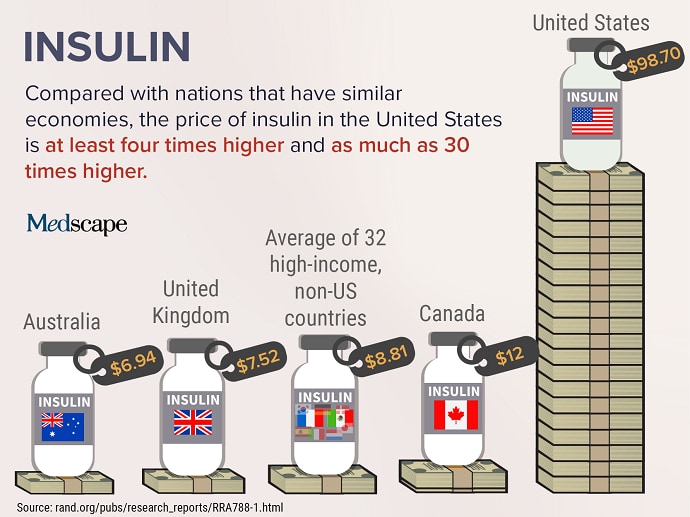Each week, we identify one top search term, speculate about what caused its popularity, and provide an infographic on a related condition. If you have thoughts about what's trending and why, share them with us on Twitter or Facebook.
From a recent study showing its high cost in the United States to findings presented at the European Association for the Study of Diabetes (EASD) 2020 annual meeting, news about insulin overtook pandemic-related issues to become this week's top trending clinical topic.
A new study conducted for the US Department of Health and Human Services' Office of the Assistant Secretary for Planning and Evaluation confirmed that insulin prices in the United States are disproportionately higher than in other, similar countries (see Infographic below). The authors of the study concluded that, even if rebates and discounts cut net prices by as much as 50%, the price paid by US consumers would still be four times the average in other high-income nations.
Although some Americans have copay caps on insulin purchases, those often do not help. The economic stress related to COVID-19 has only exacerbated cost-related concerns, leading to a rise in underground exchanges. Before the pandemic, many in the United States crossed the border into Mexico or Canada to buy cheaper insulin. Current travel concerns are only further complicating that stopgap measure.
More encouraging news was also recently reported, as positive findings from several studies were presented at this year's virtual EASD. New data were presented for Lilly's ultra rapid–acting insulin lispro, as well as for an even more ultra rapid–acting insulin, Arecor's AT247. The phase 3 data for patients taking lispro found no difference in terms of A1c reduction compared with those taking standard lispro. Phase 1 data for AT247 found that it worked 23 minutes faster than the routine aspart and 9 minutes faster than the fast-acting insulin aspart.
The eagerly anticipated, once-weekly insulin, icodec, was also discussed at EASD. Phase 2 data recently published in The New England Journal of Medicine showed comparable efficacy and safety to once-daily insulin glargine U100. Experts believe that this may well represent one of the greatest leaps in diabetes-related innovation since the discovery of insulin back in 1921, which is why it is being called "centennial insulin."
Results of yet another study presented at EASD found that women with preexisting diabetes who become pregnant can safely take the basal insulin detemir. Women who have diabetes before pregnancy are at a two- to fourfold increased risk for perinatal complications or neonatal death compared with women who do not have diabetes. The study found that insulin detemir did not further increase these risks compared with other basal insulins.
Because more than 400 million people worldwide have diabetes, with 1.6 million deaths directly attributed to the condition each year, news about insulin is always likely to be met with great interest. The combination of pricing concerns and encouraging study findings resulted in its becoming the top trending clinical topic of the week.
Medscape © 2020 WebMD, LLC
Any views expressed above are the author's own and do not necessarily reflect the views of WebMD or Medscape.
Cite this: Ryan Syrek. Trending Clinical Topic: Insulin - Medscape - Oct 23, 2020.






Comments